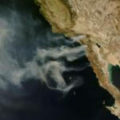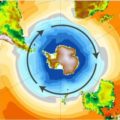
The equatorial icecaps in the Rwenzori Mountains, East Africa, will disappear within twenty years because of global warming, a University College London (UCL) study has found. The researchers, reporting in the journal Geophysical Research Letters, point the finger at an increase in air temperature over the last four decades that has contributed to a substantial reduction in glacial cover.
Known as the ‘Mountains of the Moon’, the Rwenzori Mountains straddle the border between the Democratic Republic of Congo and the Republic of Uganda. They are home to one of four remaining tropical ice fields outside of the Andes and are renowned for their spectacular and rare Afroalpine flora and fauna.
The Rwenzori glaciers were first surveyed a century ago when glacial cover over the entire range was estimated to be 6.5 square kilometers. But the survey conducted by UCL with researchers from Makerere University, Uganda and the Ugandan Water Resources Management Department, show that some glaciers are receding tens of meters each year, and that the area covered by glaciers halved between 1987 and 2003.
“Recession of these tropical glaciers sends an unambiguous message of a changing climate in this region of the tropics,” said UCL’s Richard Taylor. “Considering the continent’s negligible contribution to global greenhouse-gas emissions, it is a terrible irony that Africa, according to current predictions, will be most affected by climate change,” he added.
The glacial recession is not expected to have a significant effect on alpine river flow due to the small size of the remaining glaciers. However, it remains unclear how the projected loss of the glaciers will affect tourism and the traditional belief systems of the local BaKonzo people. Nzururu – the local word for snow and ice – is the father of the spirits who are responsible for human life. Additionally, the rise in air temperature may trigger dramatic increases in malaria in the East African Highlands, as mosquitoes are able to colonize previously inhospitable highland areas.








Comments are closed.